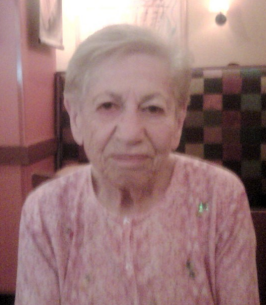Obituary for Hilda Reich

Hilda was born to Adam and Paula Schulcz, on May 17, 1926, in Galanta, Czechoslovakia, the youngest of five children. Of her childhood, Hilda often and emphatically said that “She was never young.” A cascade of familial and historical events framed that statement. By the time she was seven, Hitler had become German Chancellor. All the events that followed, from the annexation of Austria, the ceaseless anti-Semitic propaganda and the “eugenic” laws that were decreed in concert with Goebbels’ campaign, the collective manifestation of hate that was Kristalnacht, coming in proximity to Neville Chamberlain’s infamous 1938 Munich pact, which signed away Czechoslovakia’s sovereignty to the Nazis while Galanta was annexed by Hungary; all of these historical events amplified the real fears of survival that stripped away any possibility of an innocent and happy childhood.
On a familial level, Adam died in 1939, just before the September 1st Nazi invasion of Poland. Paula maintained her local bakery, and as the local situation deteriorated, Paula served as a conduit for smuggling local Jews out of Nazi-controlled areas. But, Paula did not do this for her own family. When the Germans invaded Hungary in early 1944, all the local Jews were rounded up, and in June, deported to Auschwitz.
Eighteen-year old Hilda was so despondent that her demeanor led Mengele to mark her for the gas chambers. Her older sister, Sari, in front of Mengele, slapped Hilda, and then pulled her away from the line to the gas chambers.
Hilda was first in Auschwitz, then transferred to an underground munitions factory, working with nitroglycerine, to be placed in bombs. She recounted that her hands and arms covered with the characteristic purple byproduct. She was liberated, in 1945, by Allied troops.
In the immediate post-WWII period, she met Fred Reich, fourteen years her elder, and they married in 1948 (and remained married until Fred’s death in 1994). In early 1951, they immigrated to the U.S. and settled in Chicago, pregnant with her elder son, Ralph (1951-1996). Eighteen months later, her younger son (now Dion Dennis) was born.
This marriage was not a happy one. Fred could be physically and psychologically abusive, obsessively jealous. He had little facility in acquiring English language skills, which furthered his tunnel vision. The combination the deficits, plus the massive displacements of the prior decades, further isolated Fred, deepening his rage, even before the cultural revolutions of the 1960s.
As the end of the 1950s approached, Hilda began to ambitiously acquire English language oral and written skills. As her children learned to read and write, she often did assignments parallel to their own, learning about U.S. history, English grammar, math, science, etc. This continued through much of her children’s elementary school education. Hilda was both hungry to acquire knowledge and communicative skills, and she was very smart.
Although Hilda would never have described herself as a kind of feminist, her determination to make her own money, and have her own career, in the early 1960s, in the face of Fred’s rage, set Hilda on a path to fiercely claim and dearly hold her individual sovereignty, an idee fixe in the decades to follow.
Beginning with a position at Passavant (now Northwestern) Hospital, Hilda, in 1964, began working at an industrial office at Metal Removal (later, Federal Mogul, now part of Tenneco). She was part of a quality control team for nearly a quarter century, until her retirement in 1988.
She subsequently worked at Loehmann’s, both in Morton Grove and, for a brief period in the late 1990s, in a branch in San Diego.
The 1990s were a difficult transitional period for Hilda. Fred died in 1994. Ralph died in 1996. Fred’s sister, Paula, died in 1998.
In 2002, Hilda bought a condo, back in Morton Grove. For the first time in her life, she had exclusive control of her own environment. The condo became her dream, incarnated. She loved this particular space. It was her sanctuary, for nearly 17 years, until she could no longer maintain it, or herself.
She also met a friend, Harriet Tyrnauer, in the building, and they became deep, lasting friends. “It’s a love affair,” Hilda say, about the relationship. Harriet died in 2009.
In sum: Unlike others, such as Hilda’s friend, the late Magda Brown, who were able to process their trauma via testimony, public presentation, even performance art, Hilda was not given to much sharing, with others, about the historical and personal darkness, tragedy and fear that often shaped her disposition and her actions. The admirable, remarkable thing is that she accomplished so much in spite of it. Perhaps a line from Paul McCartney’s song, Blackbird, sums it up: “Take these broken and wings and learn to fly.” And, so she did.
Arrangement by Mitzvah Memorial Funerals, 630-Mitzvah (630-648-9824).